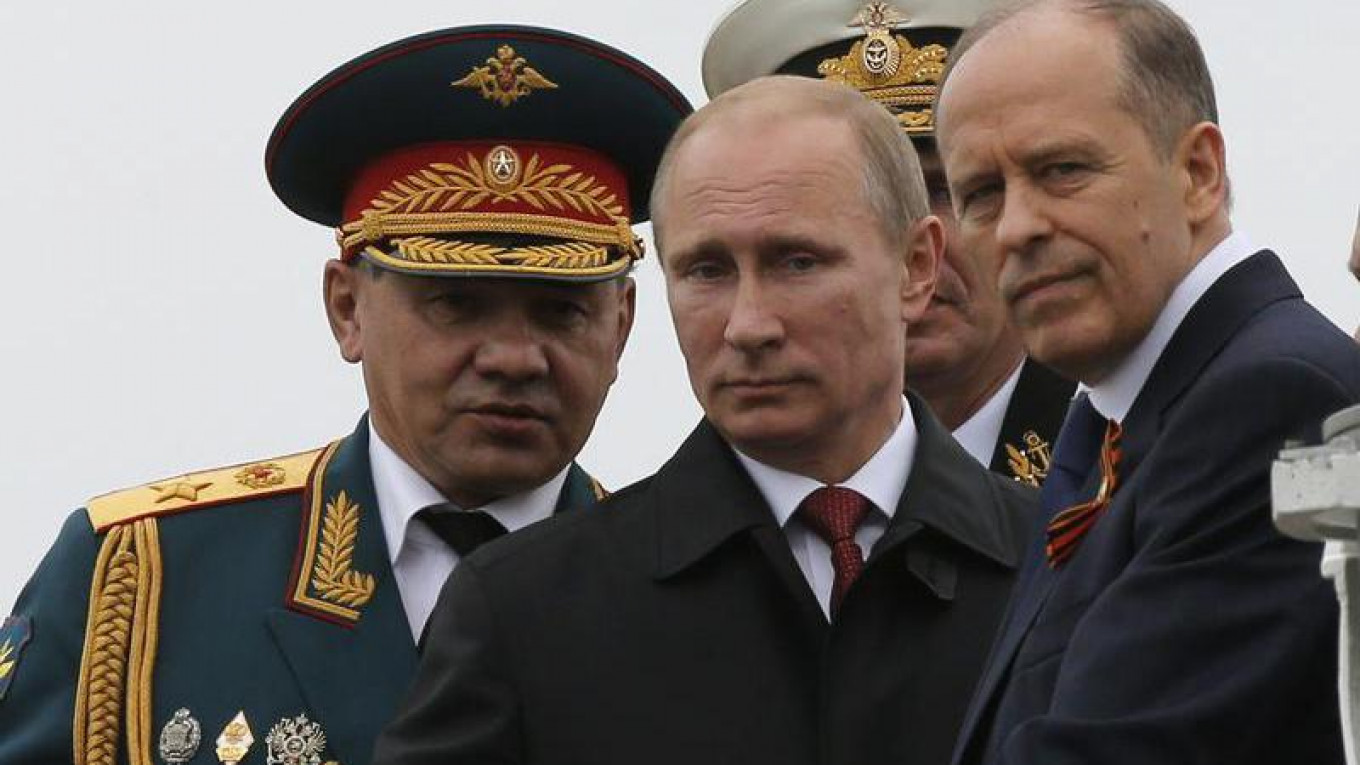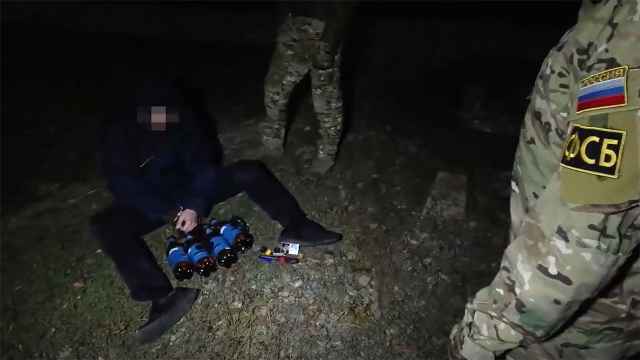Russian President Vladimir Putin accused Kiev on Wednesday of organizing a terrorist attack in Crimea, the southern Ukrainian region that Russia annexed in 2014.
“Our security services prevented the entry of a Ukrainian military sabotage and reconnaissance group into Crimea,” Putin said at a press conference in Moscow after meeting with Armenian President Serzh Sargsyan. He accused Kiev of "resorting to terrorism” in an attempt to distract its population from that government's endemic corruption problems, according to a report from the Interfax news agency.
Putin added that the apparent Ukrainian sabotage efforts meant it made no sense to hold an upcoming meeting of the Normandy group, which was formed in 2015 to implement a peace agreement in Ukraine. The group, made up of Ukraine, Russia, France and Germany, was due to convene on the sidelines of the upcoming G20 summit in China on September 4-5.
“What’s the point of talking to [Ukrainian President Petro] Poroshenko? He’s always lying. Kiev is not doing anything for peace, but is openly preparing for war”, political analyst Alexei Chesnakov, former political adviser to the Kremlin, commented on his Facebook page.
But experts on the Ukrainian side say Putin might be the one raising the stakes. “By abruptly breaking the peace talks process he frightens the West with a new escalation,” Vladimir Fesenko, the head of Ukraine's Penta think tank, told The Moscow Times.
The Russian president’s words came just hours after the Russian Federal Security Service (FSB) said in a statement that it had foiled three attempts by Ukrainian military units to enter Crimean territory, which resulted in armed confrontations and the deaths of two Russian servicemen.
The first incident allegedly occurred Aug. 6 in the Crimean town of Armyansk when the FSB said intelligence officers apparently detained a group of Ukrainian saboteurs in possession of twenty homemade explosive devices, anti-personnel and anti-tank mines, as well as some special forces equipment said to be used by the Ukrainian military.
The FSB also claimed to have stopped two Aug. 8 incursion attempts by sabotage groups from the Ukrainian military that took place “under the cover of heavy supporting fire and armored vehicles operated by the Ukrainian military.”
The validity of the FSB’s narrative was immediately disputed in Kiev.
Ukrainian Deputy Prime Minister Ivanna Klympush tweeted Wednesday: “FSB made another hoax. Ukraine is not using military means to return its territory.”
Analysts in Ukraine also cast doubt on the FSB’s claims. “These statements raise questions,” said Vladimir Fesenko.
“Why has it only now been revealed, and not right after the alleged attack?” Fesenko told The Moscow Times on Wednesday. “Where is the evidence of the massive suppressing fire? There was no evidence of this near the border over the weekend. There was certainly military activity, border closures, and movement of military vehicles. But no signs of fire.”
Instead, Fesenko said a radical Ukrainian group could have been involved.
Russia seized the Crimean Peninsula from Ukraine in March 2014 after popular demonstrations in Kiev toppled the pro-Russia government of Viktor Yanukovych. The annexation caused a collapse in relations between the two countries that was further exacerbated by Russian backing for separatist rebels in eastern Ukraine.
Tensions in eastern Ukraine region have flared recently, with the Ukrainian military and pro-Russian rebels accusing each other of repeated ceasefire violations.
The past week has also seen reports of Russian military maneuvres in Crimea, and, over the weekend, Russia reportedly closed parts of its side of the border with Ukraine in Crimea.
One of the Russian officers killed in the apparent confrontation has already been buried in the Crimean capital of Simferopol, according to sources cited by Russia’s Kommersant newspaper Wednesday.
The incursion, if confirmed, would represent the most violent episode on the southern peninsula since Russia's February 2014 annexation. Putin said the alleged Ukrainian sabotage attempt will prompt additional security measures across the Crimean peninsula.
The move will fuel speculation of a renewal of armed conflict, but experts still doubt the incident will be used as a pretext for full-scale war with Ukraine. Russia is trying to get Western sanctions lifted, and those are tied to the February 2015 Minsk ceasefire agreement negotiated by the Normandy Group.
Sanctions leave Russia with no good reason to launch a full-scale offensive in Ukraine, especially since there is no low-hanging strategic fruit to be taken, according to Vladimir Frolov, a Russian political analyst. Rather, the Kremlin is interested in fueling low-intensity fighting to pressure Kiev into accepting concessions.
Indeed, a full-scale intervention would destroy the game of diplomacy Putin has been playing with Western leaders via the Minsk ceasefire agreement, according to Fesenko. The incident will most likely lead to a tightening of Moscow's grip over Crimea by more repression of local opposition voices and a strengthening of security arrangements, he said.
A Message from The Moscow Times:
Dear readers,
We are facing unprecedented challenges. Russia's Prosecutor General's Office has designated The Moscow Times as an "undesirable" organization, criminalizing our work and putting our staff at risk of prosecution. This follows our earlier unjust labeling as a "foreign agent."
These actions are direct attempts to silence independent journalism in Russia. The authorities claim our work "discredits the decisions of the Russian leadership." We see things differently: we strive to provide accurate, unbiased reporting on Russia.
We, the journalists of The Moscow Times, refuse to be silenced. But to continue our work, we need your help.
Your support, no matter how small, makes a world of difference. If you can, please support us monthly starting from just $2. It's quick to set up, and every contribution makes a significant impact.
By supporting The Moscow Times, you're defending open, independent journalism in the face of repression. Thank you for standing with us.
Remind me later.





